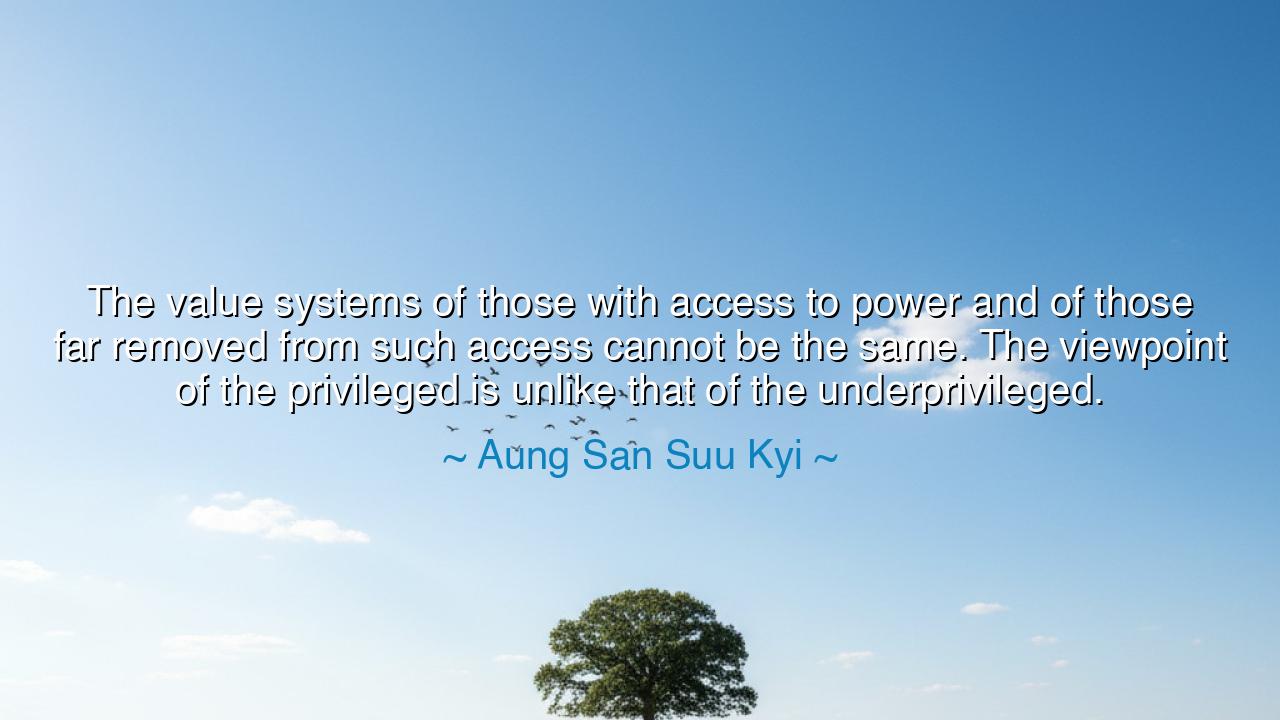
The value systems of those with access to power and of those far
The value systems of those with access to power and of those far removed from such access cannot be the same. The viewpoint of the privileged is unlike that of the underprivileged.






The world is shaped by countless eyes, yet not all eyes see alike. When Aung San Suu Kyi, the daughter of Burma’s freedom movement, declared, “The value systems of those with access to power and of those far removed from such access cannot be the same. The viewpoint of the privileged is unlike that of the underprivileged,” she spoke to an eternal truth of human society: that life’s station shapes one’s vision, and with it, one’s very understanding of justice and necessity. Those who dwell in comfort see a different world than those who labor in suffering.
For those with power, the world often appears as a field to be managed, a game of laws, policies, and distant decisions. Their values tend toward preservation—preservation of order, of wealth, of their own positions. Yet for the underprivileged, life is not a game but a daily struggle for survival, dignity, and hope. Their values arise from the raw edge of reality, forged in hunger and hardship. Thus, two truths emerge: one of comfort, and one of struggle. When these truths clash, misunderstanding and conflict are born.
History bears witness to this divide. In pre-revolutionary France, the opulent court of Louis XVI and Marie Antoinette lived in unimaginable luxury, while peasants starved under crushing taxes and famine. The queen, isolated in her palace, is said to have remarked, “Let them eat cake,” when told of the people’s hunger—a statement, whether legend or fact, that symbolizes the blindness of the privileged to the pain of the underprivileged. This gulf of understanding ignited the fires of the French Revolution, proving that when value systems diverge too greatly, society itself trembles.
Yet Aung San Suu Kyi’s words also carry a message of responsibility. She herself endured years of house arrest, separated from power, tasting the loneliness and vulnerability of the oppressed. Her insight came not from theory, but from experience. To bridge the chasm between privilege and suffering, those in power must strive to see through the eyes of the underprivileged, to let compassion temper decision-making. Without this effort, rulers become tyrants, and the governed become rebels.
Let this truth be carried to future generations: power distorts perception, and privilege blinds as surely as darkness. The wise leader must walk among their people, listening, learning, and humbling themselves before the realities they do not live. For a realm divided into two worlds cannot stand forever. Only when the value systems of the mighty are harmonized with the needs of the lowly will justice flow like a river, nourishing both the palace and the village alike. In this harmony lies the hope of peace and lasting unity.






TNGia tieu nguyen
This statement makes me question the assumptions behind power and privilege. Could the difference in value systems explain persistent social inequalities, as those in power may inadvertently prioritize stability and self-interest over justice and opportunity? I’m curious about strategies to cultivate mutual understanding between these groups. Can immersive experiences, dialogue, or structural reforms effectively align the perspectives of the privileged and underprivileged, or is the gap fundamentally inevitable?
DMTran Duc Manh
I feel challenged and contemplative reading this. It suggests that moral and practical priorities differ based on lived experience. Does this mean that solutions designed by the privileged are inherently limited or biased? I also wonder whether mechanisms like inclusive governance, community consultation, or accountability frameworks can reduce these gaps in perspective. How can societies ensure that the underprivileged influence policies that impact their lives directly?
NNNhi Nguyen
This quote sparks reflection on leadership and governance. How often do policymakers fail because they cannot fully comprehend the realities of those they govern? I’m curious whether exposure to diverse socioeconomic conditions could reshape the viewpoints of the privileged in meaningful ways. Could education, empathy-building initiatives, or participatory decision-making processes help narrow the disconnect between those with power and those without?
HAhai anh
I find this statement thought-provoking because it highlights the influence of context on moral and practical judgments. Could it be that value systems are not inherently different but are shaped by access, opportunity, and necessity? I also wonder how this disparity affects social cohesion and justice. Can societies create mechanisms that allow both perspectives to coexist, or must privilege be actively challenged to achieve equity?
HQ32- Ho Hong Quang
Reading this, I feel a mix of awareness and frustration. It raises the question: how can the privileged recognize the limits of their perspective without dismissing it entirely? I’m curious whether genuine understanding can exist between these groups, or if structural change is necessary to ensure the voices of the underprivileged are not only heard but prioritized in decision-making processes.